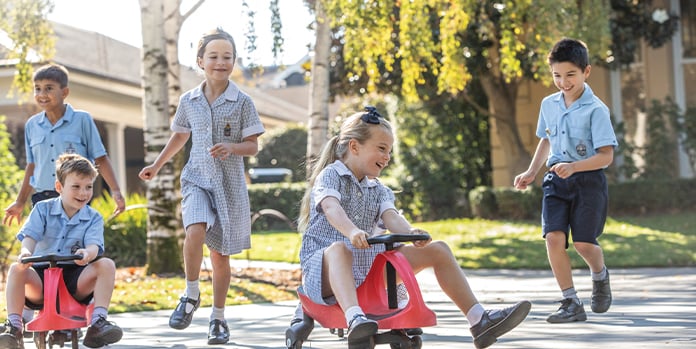Helping students learn how to navigate friendships is an important aspect of Melbourne Grammar School’s pastoral care program, and this begins in Prep at Grimwade House.
“We believe that strong and positive friendships are one of the cornerstones of happiness for many people, and we know that happy children are more predisposed to learning,” says Jane Thomas, Deputy Head of Grimwade House. “This is why we have explicit strategies in place to help them build the skills and attitudes needed to develop meaningful and long-lasting friendships.”
A shift in friendships over time
There is significant evolution in how children approach building friendships across their primary school years according to Jane. “Prep students are quite egocentric, so they tend to focus on the game they are playing in the playground, rather than who they are playing with,” she explains. “About halfway through Year 1 we notice a shift towards more collaborative play, and then in Year 2 a more noticeable change occurs when games become more formalised, and rule driven.”
The middle years of primary school education tend to be the most challenging for many children in terms of building relationships with their peers. At this point, negotiating friendships, managing friendship groups and hierarchies, and a big injection of hormones makes the process more complex. Children also become more aware of where they fit in the world, and a big part of their world is primary school.
“When students reach Years 5 and 6, and the use of social media begins to emerge, there is a necessary shift in the focus in our program,” Jane adds.
A carefully planned approach
“It is important to recognise that friendships tend to change throughout our lives,” says Jane. “Young children don’t always naturally have the skills or resilience to deal with this, so we work with our children to help grow their capacity to build new and strong friendships.”
“Our teachers are experts in guiding children through each of their developmental phases,” Jane says. “Our pastoral care program has specific intentions and actions which directly address friendship related issues.”
The structured program is designed to develop a consistent understanding and language relating to this area across the School. It is underpinned by values such as respect, kindness, loyalty and trust.
Explicit teaching around building positive and respectful relationships occurs in every classroom. For example, during Years 2 to 4, teachers ask students to firstly look at their own personal strengths and how they can use those to build friendships. Classes discuss how friendships can change over time, and students are given specific strategies they can use in the playground every day. Students are invited to implement the strategies, then discuss how they worked for them and how they could adjust their approach.
“We also have strategies in place which are intended to prevent issues arising in the playground. As just one example, we have a ‘buddy bench’ for young students. If children can’t find anyone to play with, they know they can sit on the bench, and this is a signal to everyone else to invite them into their game. This works well for our youngest students,” says Jane.
If children need more guidance and assistance, teachers can call upon the School Psychologists and the Grimwade House pastoral care team for support.
“In the end, we want our School to be inclusive, harmonious and full of diverse friendships,” says Jane. “Guiding children to build the skills to have strong and positive relationships is crucial to a child’s development and we are proud of the welcoming and nurturing community that we have at Grimwade House.”



